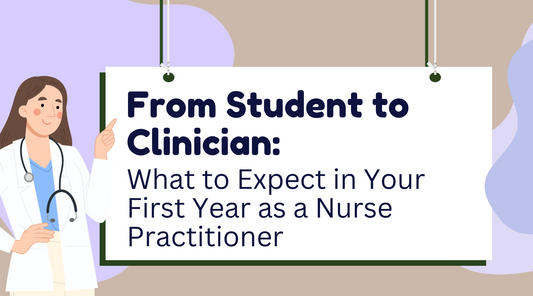Preceptorship is a cornerstone of nurse practitioner (NP) education. It offers NP students crucial clinical experience and mentorship, empowering them to develop the skills they need to succeed as healthcare professionals. But who exactly qualifies to serve as a preceptor for NP students? This blog post breaks down the qualifications and essential characteristics of effective preceptors, guiding you toward choosing the right mentor for your clinical experience.
Why Preceptorship Matters
Preceptorship provides NP students with real-world learning opportunities, bridging classroom knowledge with practical, hands-on experience. It's through preceptorships that NP students gain insights into clinical decision-making, patient management, and the nuances of advanced practice nursing.
Before seeking out a preceptor, NP students should consult their educational institution or program, as the qualifications and selection criteria for preceptors may vary. Each program may have specific requirements regarding who can serve as a preceptor.
Who Can Serve as an NP Student Preceptor?
The qualifications for preceptors are designed to ensure NP students receive quality guidance. While these qualifications may vary, here’s a breakdown of who commonly serves in this essential role:
1. Nurse Practitioners (NPs)
Experienced nurse practitioners are often the ideal preceptors for NP students, given their deep clinical knowledge and expertise. NPs in the same specialty as the student can offer valuable insights into advanced practice, including assessment, diagnosis, treatment planning, and patient care management. As they’re experienced in both the clinical and leadership aspects of the role, they can model the holistic, patient-centered care that NPs are trained to provide.
2. Physicians
Physicians also serve as preceptors, particularly in specialties where collaboration between NPs and doctors is common. While the role and scope may differ, physicians offer a unique perspective on medical decision-making, diagnosis, and treatment, enriching an NP student’s training. Physician preceptors can guide students through advanced clinical scenarios that challenge their decision-making processes.
3. Advanced Practice Registered Nurses (APRNs)
Other APRNs—such as certified nurse midwives (CNMs) or certified registered nurse anesthetists (CRNAs)—may be suitable preceptors depending on their area of practice and the student’s specialty. These experienced practitioners can help students learn valuable skills in their specific areas of expertise.
4. Physician Assistants (PAs)
Physician assistants, who practice under the supervision of a physician, can also act as preceptors. In settings where collaborative practice is emphasized, PAs provide valuable hands-on mentoring, particularly in more specialized roles. They can share perspectives on patient care and clinical procedures in a dynamic, team-oriented setting.
Key Characteristics of Effective NP Preceptors
The impact of a preceptorship greatly depends on the preceptor's ability to foster student growth in a clinical environment. Here are the essential qualities that make an effective preceptor:
1. Clinical Competence
A great preceptor must have a comprehensive knowledge base and demonstrate clinical excellence in their area of practice. They should be familiar with evidence-based guidelines, best practices, and patient-centered care principles, all of which are crucial for fostering student learning and providing top-notch patient care.
2. Strong Communication Skills
Clear communication is key in a mentoring relationship. An effective preceptor should be able to provide concise instructions, constructive feedback, and maintain open, two-way communication with students. Whether discussing complex clinical scenarios or offering guidance during challenging cases, preceptors should ensure their feedback is both supportive and informative.
3. Commitment to Teaching
A dedicated preceptor has a genuine passion for education and mentorship. Effective preceptors actively involve students in clinical activities, discussions, and learning opportunities. By emphasizing both didactic learning and hands-on experience, preceptors help students grow their clinical judgment and critical thinking skills.
4. Professional Role Model
Preceptors should lead by example, exhibiting professionalism in their clinical practice, communication, and behavior. This includes modeling compassion, ethical behavior, cultural competence, and a commitment to lifelong learning. NP students often look to their preceptors to not only guide their technical skills but also shape their professional identity.
5. Supportive Mentoring
Effective preceptors create a supportive, encouraging learning environment where students feel confident and empowered to ask questions, reflect on mistakes, and develop their clinical reasoning skills. Good mentoring builds trust and fosters the development of the student’s confidence and competence in practice.
The Impact of Effective Preceptorship on Future NPs
Healthcare professionals who serve as preceptors play an essential role in shaping the next generation of nurse practitioners. As a mentor, you not only pass on clinical knowledge but also influence the professional development of future healthcare leaders. A strong preceptorship helps ensure high-quality patient care by nurturing competent, compassionate NP students who will continue to advance the field for years to come.
Whether you are an NP, physician, APRN, or PA, embracing the role of preceptor comes with responsibility and great rewards. Precepting is not just about teaching clinical skills—it’s about providing support, guidance, and inspiration to future NPs as they take their next steps toward becoming competent, compassionate, and confident healthcare providers.
Looking to become a preceptor or find one?
Reach out to your professional network, educational program, or student advisors to explore preceptorship opportunities and get the guidance you need.




1 comment
I am willing to precept PMHNP students